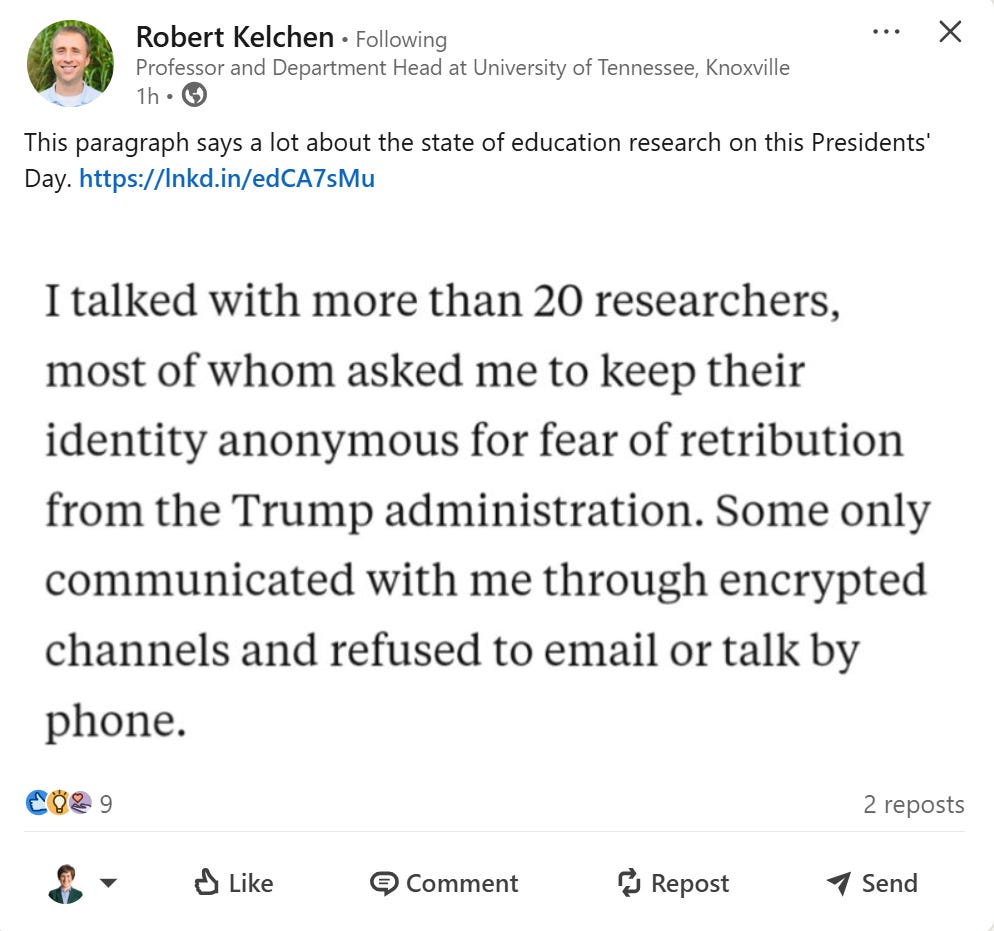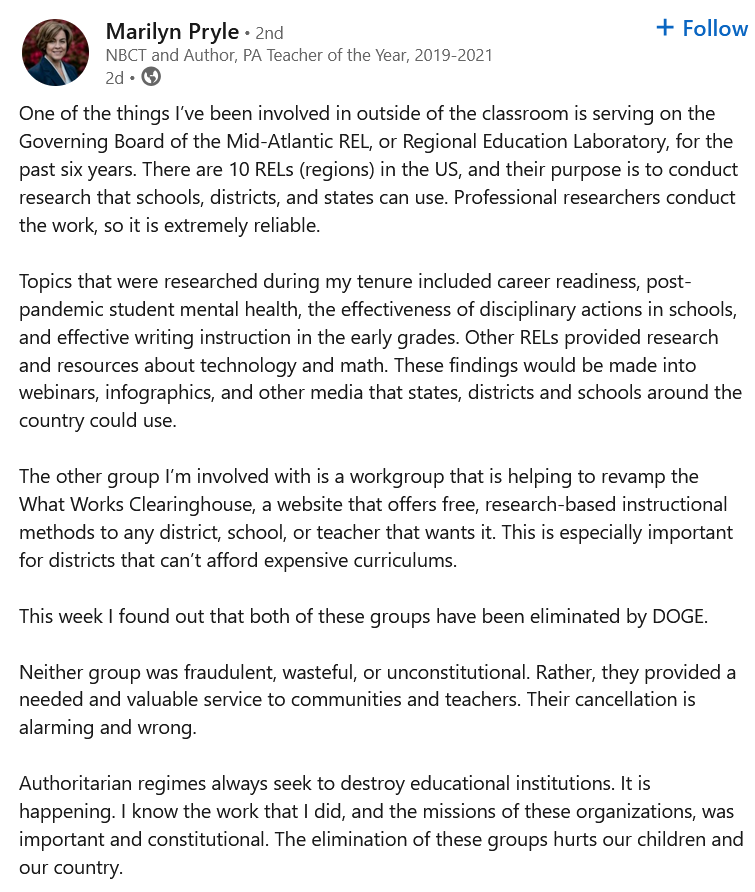Civilytics’ statement on slashing the Department of Education’s research
The Civic Pulse has been on an unplanned 14-month hiatus as we were blessed with lots of interesting projects keeping us busy. Now it’s back, making an unplanned reappearance, because lots of those projects were abruptly canceled last week with the termination of most contracts at the Institute of Education Sciences (IES). To learn about the cancellations from a more objective perspective, please check out these articles from Education Week and The Washington Post. Why write now? We hope to achieve three things:
- To give voice to the direct impact contract cancellations have on people and their work. It is important to go beyond the headlines and document direct impacts.
- To defend the valuable work that has been lost due to these actions.
- To catalyze others to share this example or their own example of how these actions are leading to specific harm.
We are speaking out because frankly we have already lost all of our education business with the federal government. We know many others may be unable or unwilling to speak out for fear of retribution, though they are impacted as well. We hope if you are in this situation you know we are thinking of you, and if and when you can speak out, we’ll be there to listen.
Quick primer: The Department of Education has the smallest staff of the 15 federal Cabinet agencies. The Department’s total budget represents 1% of the overall federal budget. Within the Department, the Institute of Education Sciences (IES) is the department’s research and statistics arm. IES is only 1% of the Department’s budget but apparently 85% of IES’s contracts were cancelled last week. It’s small potatoes on the grand scale of federal spending but very large potatoes in our world as it’s the (one of the?) main source(s) of education research funding. Quick personal primer: It also funds (funded?) the doctoral program where we met each other and many of you. And then also, of course, funded many of our colleagues’ work since then! With hundreds of billions spent on K-12 education each year, IES’s focus is on tracking student outcomes, evaluating what education programs, strategies, and initiatives are worth the investment, and providing data on students, teachers, schools, and colleges that is literally used by countless stakeholders.
Of course, there were signs that cuts were coming – the decimation of USAID, the Republican administration’s rhetoric around education and disdain for numbers, data, and facts. So, while these cancellations technically weren’t out-of-the-blue, or on the list of most egregious decisions made in the past few weeks, they did radically reshape our work, expectations for the future, and more starting last Monday around 3:30pm.
Before sharing more about the canceled projects, we want to share some thoughts on what feels particularly frustrating about the administration’s approach:
- Lack of transparency – There wasn’t (or isn’t?) an official list of all the contracts that were canceled. We had three subcontracts for the What Works Clearinghouse canceled and heard of others. Were all the WWC’s contracts cancelled?
- The havoc one person can wreak on countless – Contracts were originally issued because experts decided more research on a topic was merited, because studies were congressionally mandated, or for other (probably thoughtful?) reasons. Then, many people were involved in issuing RFPs, submitting proposals, and evaluating bids. Then one person unilaterally canceled all of it, affecting so many people’s lives (researchers yes but also educators for sure).
- Apparent (?) acceptance of assertions at face value – Statements like cancellations were for waste or fraud, or because of a focus on particular topics (e.g., DEI), seem to continue to be taken at face value despite the scope of contracts canceled, lack of information on what contracts were actually for, and ample evidence to the contrary. Similarly, we continue to see outlets/individuals report that department spokespeople say some contracts will be rebid without mentioning in the same sentence how this contradicts the stated goal of eliminating the Dept. of Education.
This is an attack on expertise, knowledge, and science across the board. We found this post on LinkedIn particularly insightful:
More on our canceled subcontracts to just add some evidence to what funds were supporting. While we welcome sympathy, we aren’t sharing this to say these were the most important initiatives eliminated in the past few weeks (they certainly weren’t!) or that we won’t be ok (we will, especially to the extent that our communities, friends, families, and world are also ok). Rather we think it’s important to give concrete examples of what is being eliminated and what it means for real people’s lives.
Last week all five1 of our Department of Education subcontracts were canceled “for convenience.” These projects were focused on:
- Improving student attendance – two projects!
- With students missing much more school than before the pandemic, this topic couldn’t be more timely and relevant. One of the projects was a WWC practice guide reviewing strategies for promoting student attendance. WWC practice guides evaluate the quality of evidence supporting different interventions, products, and practices and share actionable recommendations for educators. We’ve heard these are among the WWC’s most used resources.2
- Another project was sharing near-time (like real-time but not quite) attendance data with educators, to their email rather than requiring them to log onto a dashboard, focusing on which student groups were slipping behind attendance rate goals.
- Cataloguing school-based mental health supports
- With many students struggling with anxiety, depression, and other mental health challenges, the Department of Education funded two grant programs to provide mental health supports to students where they are – schools. While the grants themselves may (??) continue, collecting, summarizing, and sharing data on the grants’ effects – how many psychologists, social workers, and counselors were hired; how many students were served; what strategies were effective for recruiting and retaining new staff – will not.
- Advising grantees on how to conduct rigorous studies that provide information about whether investments truly move the needle on student outcomes – two projects!
- Grantees often have deep experience with and great ideas on new approaches that could help students – peer mentoring, student success coaches, financial incentives – but less experience evaluating whether these ideas actually translate to gains for students. We had two cancelled subcontracts providing assistance to grantees (colleges, universities, K-12 education agencies) to conduct research evaluations.
Could efficiencies have been found in some of these projects? Yeah. Some of the projects even had suggesting efficiencies for future years built in. And also have you ever worked on a project or for a company where nothing could be improved? The cancellations had nothing to do with efficiency or value – they were wholesale cancellations of as many contracts at the Institute of Education Sciences (IES) as possible.
Obviously many federal workers have already lost their jobs. The federal government conducts much of its work through contracts, and contractors are beginning to be laid off too. Our subcontracts were for organizations – American Institutes for Research, Mathematica, Abt Global – with thousands of staff, quite a few of whom we know personally! The terminations affect us but likely affect staff at these companies just as much! And the cuts ultimately will – even if indirectly, more long-term, and less clearly – affect schools, educators, and students.
If the federal government (and us as taxpayers) don’t invest in education research, who will?
- Universities (to some extent but they’re not in a good place at the moment either)
- Philanthropies (we’re so thankful to have philanthropy-funded work now, but philanthropic investments are limited in conducting the type of national data collection that’s a hallmark of the federal government’s work)
- Education technology/curriculum/product development companies
The third group has a vested interest in achieving certain results – this research isn’t equivalent to federally funded research where impartiality, objectivity, and lack of vested interest in outcomes is key. If most “research” comes from those making money off the product, how can schools or educators trust it?
Again, we want to reiterate that we’re sharing this not because our experience is unique or because it’s particularly egregious in the scheme of current events but because we think the country needs as many examples of the impacts of the administration’s actions as possible. We’ve talked to our state and federal representatives about the impact of these cuts this week, and we hope you are also reaching out to yours as often as possible (use this site to find your federal representatives’ local and DC numbers as well as phone scripts if useful). We found it cathartic to be listened to and an opportunity to educate them about the importance and value of publicly funded education research.
To colleagues in this space – and particularly to any reading this whom we might have worked with on the projects above or others – we are thinking of you, we loved working with you, we hope our work continues in the future, and we know you are eminently competent researchers doing work that shouldn’t have been cancelled for one person’s “convenience.”
It is easy to feel powerless to do anything against the extremely wealthy at the helm of the state, but one thing we can do is support each other and speak up. The more of us who speak up and the more we support each other, the harder our experiences are to deny. This is our contribution, and we want to be sure to support you however we can. If you want to share your experience or your feelings on these actions – we encourage you to share this newsletter as an example, comment below with your own story, or, if you want to share privately, please feel free to email us (or reach out on Signal). We promise to listen.
- Maybe six or seven? We had another project for which our work was supposed to start in the fall (though the prime contract had been underway for a while). We assume it was surely canceled too as it was an IES research study examining outcomes for English learners. We also had an outstanding request to sign a small contract for a Regional Educational Laboratory that was also canceled before we signed the paperwork! ↩︎
- We couldn’t find a citation for this but have heard it from several reputable sources… ↩︎



